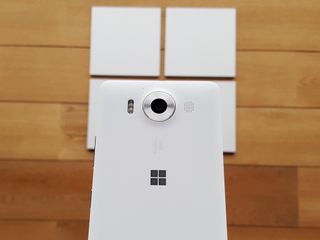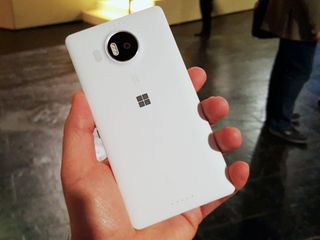Verizon reportedly blocking new Microsoft Lumia 950 and 950 XL phones from their network

For many months now I have stated that it was only AT&T in the US picking up the Lumia 950 – not even the Lumia 950 XL – with other carriers being sidelined. Since then, there have been a few back and forth exchanges between Microsoft and T-Mobile for the blame. Verizon, so far, has remained quiet on the situation seemingly not caring either way.
On Windows Weekly #435 Paul Thurrott and Mary Jo Foley both point the finger at Verizon. The radios in the Lumia 950 and Lumia 950 XL should technically support Verizon's CDMA band for phone calls, leading many to wonder why Microsoft just doesn't sell the phone unlocked with Verizon's bands.
According to Mary Jo Foley, she heard that Verizon won't authenticate the phones to work on their network. The reason is due to the nature of CDMA, which has MEIDs (Mobile equipment identifier) that must be added to the Verizon system and network even if they are unlocked. Without Verizon adding – and in a sense blessing – these phones on their network, they would never work. (Customers typically need to call the carrier and manually enter in the MEID in order to activate the phone. However, if the phone is not listed in the database or the unique ID device code is blocked, it cannot work.).
Due to the complexities of the situation, it would make sense that a new owner of a Lumia 950 would blame Microsoft for the situation when it was Verizon's refusal to accept the phone. As a result, Microsoft has reportedly disabled the CDMA portion of the radio since Verizon would not allow it. Although there is no mention of Sprint in the conversation the same rules would apply to them as well. However, it is not clear what Sprint's position is on this matter.

Such a CDMA/MEID system does not exist for GSM carriers like AT&T and T-Mobile, and it can be considered unique to the US. Even with T-Mobile unlocked phones not sold by the carrier are unlikely to support such features as Wi-Fi calling. Having said that, these new Lumias should work on T-Mobile's GSM network for data and calls, though such a scenario still needs to be verified.
As Thurrott and Foley note, Microsoft is trying their best to these phones into user's hands, but the company is facing many obstacles. Having the largest carrier in the US shun Microsoft is a big blow, but should not be surprising. In the past, Verizon has requested exclusive phones like the Lumia 928, Lumia Icon and Lumia 735 only to promote them half-heartedly after months of delays for approval.
For what it is worth, Verizon has done similar things in the past. The Nexus 7 and Nexus 5 have also had the same issue with Verizon's network.
Get the Windows Central Newsletter
All the latest news, reviews, and guides for Windows and Xbox diehards.
If true, Verizon's actions appear to be more of spite than technological. Windows Central is reaching out to Verizon for comment on the matter, and we'll update this article if we received a response on the matter.
You can fast-forward to the 1:01:18 mark to hear the full conversation on Windows Weekly.
Source: Windows Weekly; via Reddit

Daniel Rubino is the Editor-in-chief of Windows Central. He is also the head reviewer, podcast co-host, and analyst. He has been covering Microsoft since 2007, when this site was called WMExperts (and later Windows Phone Central). His interests include Windows, laptops, next-gen computing, and watches. He has been reviewing laptops since 2015 and is particularly fond of 2-in-1 convertibles, ARM processors, new form factors, and thin-and-light PCs. Before all this tech stuff, he worked on a Ph.D. in linguistics, watched people sleep (for medical purposes!), and ran the projectors at movie theaters because it was fun.